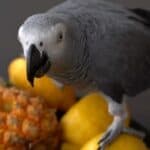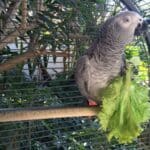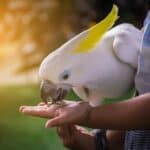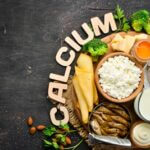Last Updated on March 4, 2024 by Carrie Stephens
Yes, parrots can eat spinach! It’s a good source of micronutrients, macronutrients, and antioxidants. Spinach is high in oxalic acid, an organic acid that limits mineral absorption, like calcium.
Too many high oxalic acid leafy-green vegetables may cause kidney stones and egg binding in gravid females. A small quantity of spinach (especially when boiled) is safe for parrots with healthy kidneys.
Benefits of Spinach for Parrots
Spinach (Spinacia oleracea) is healthy for parrots, whether raw or cooked. According to the International Journal of Life Sciences and Review, spinach contains:
- Vitamin A (141 mcg).
- Vitamin K (145 mcg)
- Calcium (29.7 mg).
- Iron (0.81 mg).
- Magnesium (24 mg).
- Potassium (167 mg).
- Phosphorus (14.7 mg).
- Folate (58 mcg).
Antioxidants include flavonoids, lutein, vitamins C and E, carotenoids, and phenolic compounds. The antioxidants in spinach reduce the damage caused by free radicals and oxidative stress.
According to the National Library of Medicine: National Center for Biotechnology Information, oxidative stress contributes to degenerative diseases.
Comparative Biochemistry and Physiology Part B: Biochemistry and Molecular Biology studied the impact of dietary antioxidants and flight training on oxidative damage in adult parrots.
The parrots in the study were fed spinach and given flight training sessions. The combination of flight training and antioxidants reduced oxidative damage over the 9 weeks.
Innovative Food Science & Emerging Technologies found that raw and frozen spinach have higher antioxidant properties than canned and jarred spinach.
The preparation method affects spinach, so canned and jarred spinach contains fewer antioxidants than fresh, raw, and frozen spinach.
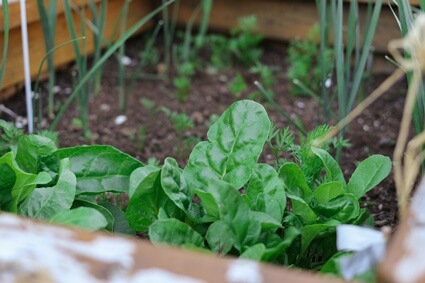
Vitamin A
Vitamin A (retinol) is a fat-soluble vitamin with antioxidant properties. Ensuring a parrot gets enough vitamin A reduces its risk of respiratory infections, beak and claw deformation, and poor growth.
Vitamin A boosts a parrot’s immune system, which fights infections (bacterial, viral, and fungal), illnesses, and diseases. It also benefits a parrot’s skin, feathers, and ocular health.
Parrots with hypovitaminosis A have brittle, broken, frayed, and discolored feathers. Also, the skin will become irritable, itchy, and sore, often leading to destructive behaviors like feather picking.
Without sufficient vitamin A, the nostril lining will dry, and secretions will accumulate in the mouth. This build-up becomes thick and crusty, making breathing more challenging.
Vitamin A is essential for good reproductive health in gravid females.
Vitamin K
Vitamin K (phylloquinone) is high in leafy green vegetables like spinach, kale, broccoli, and cabbage.
It’s essential for strong bones because it regulates calcium and phosphorus metabolism. It’s also necessary for blood coagulation after sustaining cuts and lacerations.
A parrot with a vitamin K deficiency will have weak bones, so it’s likelier to sustain fractures. If it sustains a wound, stemming the blood flow will be more difficult and take longer.
Bacteria in birds’ bowels can produce vitamin K. While deficiencies are uncommon, they can occur following the overuse of antibiotics, which kills bacteria.
Iron
Iron is essential for creating hemoglobin, which carries oxygenated blood around the body. Vitamin C converts iron into ferrous, which is more easily absorbed.
Feeding parrots iron-rich foods can prevent anemia, which makes them tired, weak, and lethargic. Too much iron is bad for parrots due to the risk of developing Iron Storage Disease (ISD).
The excess iron is stored in the liver as hemosiderin, causing hepatocellular damage (haemochromatosis) once the maximum storage threshold has been exceeded.
According to Veterian Key, the minimum iron requirement for Psittaciformes is 80 ppm.
Calcium
Spinach is high in calcium, which keeps birds’ bones strong. Without adequate amounts, parrots can develop a calcium deficiency (hypocalcemia), which can lead to:
- Bone weakness and fractures.
- Egg abnormalities.
- Dystocia.
- Skeletal decalcification.
- Weakness.
- Tremors.
- Seizures.
Acute Hypocalcemia occurs when there are low serum calcium levels in the blood. Ensure a parrot receives ample calcium through spinach and other calcium-rich foods.
Birds can’t absorb calcium without vitamin D3, which is synthesized from exposure to the sun.

Magnesium
Without sufficient magnesium, calcium won’t be adequately absorbed. If this happens, it leads to calcification of the arteries (arteriosclerosis), joints, and other soft tissues.
Magnesium also relaxes the muscles, nerves, and brain. Deprived of this essential mineral, it can result in muscle twitching and jerking, like toe-tapping and wing-flapping.
Cooking spinach (rather than offering it raw) increases the amount of magnesium. However, cooking spinach reduces the number of antioxidants like lutein.
Antioxidants
Spinach is a superfood because antioxidants like lutein, beta carotene, coumaric acid, and ferulic acid reduce harm from free radicals to a parrot’s body.
Protein
Spinach isn’t high in protein but is among the best plant-based sources. Also, it contains all 9 essential amino acids, which are the building blocks of protein.
Protein is essential for healthy feathers, especially after molting. It’s also needed for building and repairing bodily tissue, hormone and metabolism regulation, and the immune system.
If you want to give parrots extra protein, they can eat meat and fish.
Water
Spinach can be beneficial if a parrot doesn’t hydrate sufficiently because it’s 93% water.
Why Spinach Is Bad for Parrots
Spinach contains oxalic acid, which binds to minerals like calcium, inhibiting absorption. It can also exacerbate kidney problems and cause egg binding.
According to the Journal of Agricultural and Food Chemistry, boiling spinach reduces the oxalate content by 30-87%. Spinach leaves shouldn’t cause issues for healthy parrots.
Amount of Spinach Parrots Can Eat
Feed parrots spinach in moderation, especially as it’s high in oxalic acid. Adding a couple of spinach leaves to a parrot’s food bowl once or twice a week, along with other vegetables, is beneficial.


